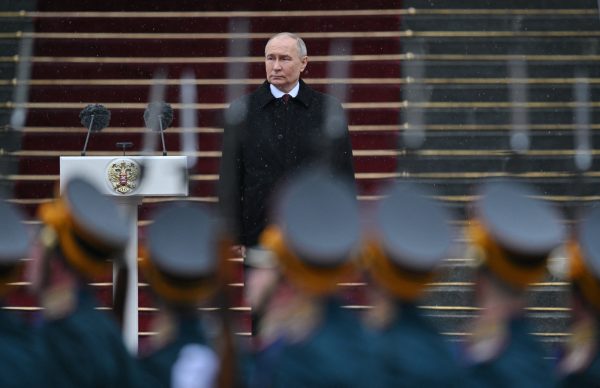After months of explosive outbursts against the country’s top military brass and its poorly prosecuted war against Ukraine, Yevgeniy Prigozhin, the owner and commander of the Wagner paramilitary group and a former close ally of Vladimir Putin, moved from threats to action.
As Wagner troops seized the city of Rostov-on-Don — home to the southern command that has been a linchpin in the war — Putin responded by condemning the action, branding Prigozhin a traitor, and vowing that the Russian military would crush the rebellion. Though Prigozhin’s march on Moscow was called off, the internal crisis in Russia is unlikely to end there. Putin has been made to look weak and indecisive.
It is worth placing the turmoil in a larger historical context. Since the 19th century, the Russian state has had a remarkably consistent record when it comes to the consequences of defeat in war, with humiliation on the battlefield translating into instability and, ultimately, systemic unraveling at home.
Russia’s defeat by a British-French-Sardinian-Ottoman coalition in the 1853-56 Crimean War was a blow to its power, marking a turning point for the Russian Empire. It was largely the incompetence of Russian military leadership that led to over 100,000 Russian battlefield casualties, with an additional 300,000 lost to disease. In contrast, the British suffered less than 5,000 dead in combat, with fewer than 16,000 succumbing to wounds and illness (and this despite some shocking incompetence on the allied side.). Russia’s defeat weakened the imperial army, drained the treasury, and undermined Russian influence in Europe. The upheaval that followed ushered in fundamental changes in Russia, including the abolition of serfdom and reforms of the government, judiciary, and, most of all, the military. The Russia that eventually emerged from the post-Crimean war turmoil bore little resemblance to the state that entered the war.
A similar pattern unfolded in the aftermath of Russia’s defeat in the 1904-05 Russo-Japanese War, culminating in the Russian Navy’s crushing defeat at the Battle of Tsushima, which delivered a comparable shock to the country’s political system and hobbled the imperial regime. The aftermath witnessed another round of internal political fracturing, leading to the 1905 Revolution that almost proved fatal to the imperial regime, forced systemic reforms upon the tsar, and caused significant domestic instability in the years that followed.
Less than a decade later, Russia’s defeat by the German army in the 1914 Battle of Tannenberg – combined with subsequent stalemates and defeats – set in motion a process that culminated in the mutiny of the Russian army, two revolutions in the span of a year, and a bloody civil war that ended with the Bolsheviks seizing power and installing a communist dictatorship.
This pattern repeated itself in the Soviet era. The Soviet Union’s defeat in Afghanistan and its withdrawal in 1989 was followed by the breakup of the Soviet empire that same year, and the state itself just two years later. Once again, the humiliating military defeat triggered convulsions at home.
It is difficult to avoid the conclusion that the imagined power of its military is a defining attribute of Russian systemic legitimacy. Nothing seems to shake the imperial self-confidence of the Russian body politic more than seeing its military exposed as hollow, weak, or inept. The actions of Prigozhin and his Wagner mercenaries must thus be taken seriously, for — bluster aside — his excoriation of the military leadership’s incompetence and corruption is sure to resonate with segments of the public, regardless of the outcome of the current crisis.
It is too soon to assess whether Prigozhin’s raid into Russia was a one-off to be followed by an even more severe crackdown by the regime, or if it will set in motion forces that could potentially transform the country. The consequences of Russian failure on the battlefields of Ukraine may have already damaged Putin’s regime beyond repair. However, if Putin recovers control he may use Prigozhin’s attempted mutiny to consolidate his power and shift to complete national mobilization, setting the stage for a new phase of Russia’s war to regain its lost empire. More likely, Russia could face a deepening crisis and a period of protracted instability.
While outcomes are hard to predict, the Russian past can offer insights into recurrent processes and patterns. At the very least, Russian imperial history has shown that the country’s autocratic political system lacks a mechanism to contain and defuse pressures at home and that it fares badly when confronted with a failed foreign policy venture or military defeat. It would be well to remember this when assessing Putin’s grip on power, and what this crisis may ultimately portend for the Russian Federation.
Chels Michta is a Nonresident Fellow with the Democratic Resilience Program at the Center for European Policy Analysis (CEPA). Chels is a former CEPA Title VIII Fellow and is currently a military intelligence officer serving in the US Army.
The opinions expressed here are those of the author and do not reflect the official policy or position of the Army, the US Department of Defense, or the US government.
Europe’s Edge is CEPA’s online journal covering critical topics on the foreign policy docket across Europe and North America. All opinions are those of the author and do not necessarily represent the position or views of the institutions they represent or the Center for European Policy Analysis.





